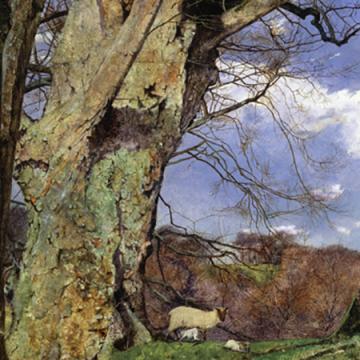Trees and Wellbeing: Past, Present and Future

In recent years, town planners, educationalists, environmentalists and psychologists have become increasingly aware of the beneficial effect exercised by trees and woodland on human development, happiness and mental health. There is a growing recognition of the importance of trees in urban areas, for encouraging sociability, play and physical exercise, as well as improving air quality. New practices, such as forest schools and forest bathing, have highlighted the contribution trees can make to learning and stress relief. But there is also a long history of people finding solace in the woods, and expressing their responses through art and literature. This conference aims to bring together researchers and practitioners from a wide variety of disciplinary and professional backgrounds to discuss how, and why, trees, forests and woodland can make us all feel better.
DRAFT PROGRAMME
| 10:00 | Arrival and coffee |
| 10:30 | Welcome and introduction |
| Christiana Payne, Professor of History of Art, Oxford Brookes University | |
| 10:40 | “Can a dose of nature become standard prescription for a mental health problem?” |
| Dan Bloomfield, NERC Knowledge Exchange Fellow in Environment and Health, University of Exeter | |
| 11:00 | “Lord Hunsdon’s Balm: Real and Magical Properties of Trees” |
| Mark Griffiths, Editor, The New Royal Horticultural Society Dictionary of Gardening | |
| 11:20 | Questions |
| 11:30 | Coffee break |
| 12:10 | “Reviving a Wood Culture” |
| Gabriel Hemery, co-founder, Sylva Foundation | |
| 12:30 | “Paul Nash: an Avant-garde Artist and his Love of Trees” |
| David Boyd Haycock, freelance writer | |
| 12:50 | Questions |
| 13:00 | Lunch |
| 14:00 | “Trees and Education” |
| Sally York, Education Policy Advisor, Forestry Commission Scotland | |
| 14:20 | “Trees, Woods and Wellbeing for Under-represented Groups” |
| Liz O’Brien, Head of Social and Economic Research Group, Forest Research | |
| 14:40 | Questions |
| 14:50 | “Valuing Forests for People and Communities” |
| Alice Mayne, Head of Recreation and Visitor Experience, Forest Enterprise England | |
| 15:10 | “Trees and writers” |
| Simon Kövesi, Professor of English Literature, Oxford Brookes University, in conversation with Fiona Stafford, Professor of English Language and Literature, University of Oxford | |
| 15:40 | Questions |
| 15:50 | Tea break |
| 16:30 | Round Table, chaired by Fiona Stafford |
| Kate Sheldon, Development Director, Trees for Cities | |
| Sarah Dandy, Programme Lead, NHS Forest | |
| Ray Hawes, Head of Trees and Woodland Conservation, National Trust | |
| 17:40 | Closing Remarks |
| Kaye Brennan, Lead Campaigner: Policy and Advocacy, Woodland Trust | |
| 18:00 | Wine reception |
A conference organised by Christiana Payne and Fiona Stafford
Conference fee: £20 (includes tea, coffee, lunch and wine reception)
A limited number of student bursaries are available to support students who wish to attend the Conference. For further details, please contact academic.office@some.ox.ac.uk making clear that your enquiry relates to the Trees and Wellbeing Conference.
Closing date for applications for bursaries is Friday 23 March 2018
Optional activities on Saturday morning
(numbers limited, first-come, first-served):
- Visit to Sylva Wood Centre and tour with Gabriel Hemery, co-founder, Sylva Foundation, Saturday 19 May, 10am–1pm
A coach will take delegates to the Sylva Wood Centre, where Gabriel Hemery will lead a walking tour of the Future Forest, Community Orchard, Forestry Yard and the Wood crafts people.
- Tour of Headington Hill Hall gardens with Michael Pirie, Head Gardener, Green Templeton College, Saturday 19 May, 10–11:30am
Oxford Brookes University is fortunate in having amongst its buildings the Victorian mansion of Headington Hill Hall, whose mature trees in a landscaped setting form the subject of this walking tour, lasting approximately 1.5 hours. We will explore the development of the house and grounds for the Morrell brewing family, as well as the health-giving quality of the hilly site to perambulating members of Oxford University.
- Visit to Ashmolean Print Room with Christiana Payne, Saturday 19 May, 10–11am
The Ashmolean has some wonderful drawings and watercolours of trees. We will look at important examples by Samuel Palmer, J. M. W. Turner, John Ruskin, Albert Moore, Edward Lear and Paul Nash.
Contact name: Christiana Payne
Contact email: cjepayne@brookes.ac.uk
Environmental Humanities, TORCH Programmes


